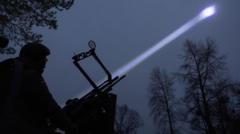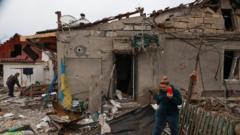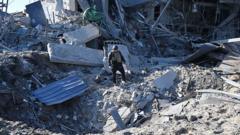President Donald Trump unveiled plans for a trilateral meeting in Munich on Friday involving high-ranking officials from the US, Russia, and Ukraine, aimed at finding a resolution to the war in Ukraine. Though Trump emphasized the importance of Russian participation, an official Ukrainian spokesperson expressed skepticism about the meeting's effectiveness, with Ukrainian President Volodymyr Zelensky prioritizing his country's involvement in any peace discussions. This development has sparked concern among European leaders regarding a possible US-Russia agreement that might undermine Ukraine's sovereignty.
Trump Proposes High-Stakes Talks to End Ukraine War in Munich

Trump Proposes High-Stakes Talks to End Ukraine War in Munich
President Trump has announced a potential meeting in Munich aimed at addressing the ongoing conflict in Ukraine, as international tensions simmer.
The announcement of the three-way talks originally surfaced during a press conference where Trump detailed his recent communications with both Russian President Vladimir Putin and Zelensky, suggesting a potential "good possibility" for peace. However, a senior adviser from Ukraine hinted that their delegation might opt out of the Munich discussions, signaling a lack of confidence in negotiations that don't fully include them.
Zelensky plans to meet with Vice-President JD Vance and US Secretary of State Marco Rubio, although unforeseen complications delayed Rubio's arrival. The urgency of the situation has grown, as European leaders, including French President Emmanuel Macron, insist that Ukraine must lead its negotiations with Russia to ensure that any peace agreement does not compromise its independence.
Since the conflict escalated when Russia invaded Ukraine nearly three years ago, the war has claimed numerous lives and displaced millions. Both sides remain entrenched, complicating the path to peace despite front-line initiatives like trade talks. With US support for Ukraine's military efforts appearing to wane, negotiations at this stage hold immense weight for the future of Ukraine and its territorial integrity, prompting deep anxieties about possible compromises that could arise in Munich.
Zelensky, grappling with the dynamics of post-war security and sovereignty, also seeks firm assurances from the US regarding ongoing support as any future peace efforts unfold. NATO's expanded role in European defense has been challenged, and participants in Munich will navigate these complexities amidst rising geopolitical uncertainty. The outcomes of these discussions could have far-reaching implications for Ukraine and the broader international landscape.
Zelensky plans to meet with Vice-President JD Vance and US Secretary of State Marco Rubio, although unforeseen complications delayed Rubio's arrival. The urgency of the situation has grown, as European leaders, including French President Emmanuel Macron, insist that Ukraine must lead its negotiations with Russia to ensure that any peace agreement does not compromise its independence.
Since the conflict escalated when Russia invaded Ukraine nearly three years ago, the war has claimed numerous lives and displaced millions. Both sides remain entrenched, complicating the path to peace despite front-line initiatives like trade talks. With US support for Ukraine's military efforts appearing to wane, negotiations at this stage hold immense weight for the future of Ukraine and its territorial integrity, prompting deep anxieties about possible compromises that could arise in Munich.
Zelensky, grappling with the dynamics of post-war security and sovereignty, also seeks firm assurances from the US regarding ongoing support as any future peace efforts unfold. NATO's expanded role in European defense has been challenged, and participants in Munich will navigate these complexities amidst rising geopolitical uncertainty. The outcomes of these discussions could have far-reaching implications for Ukraine and the broader international landscape.





















